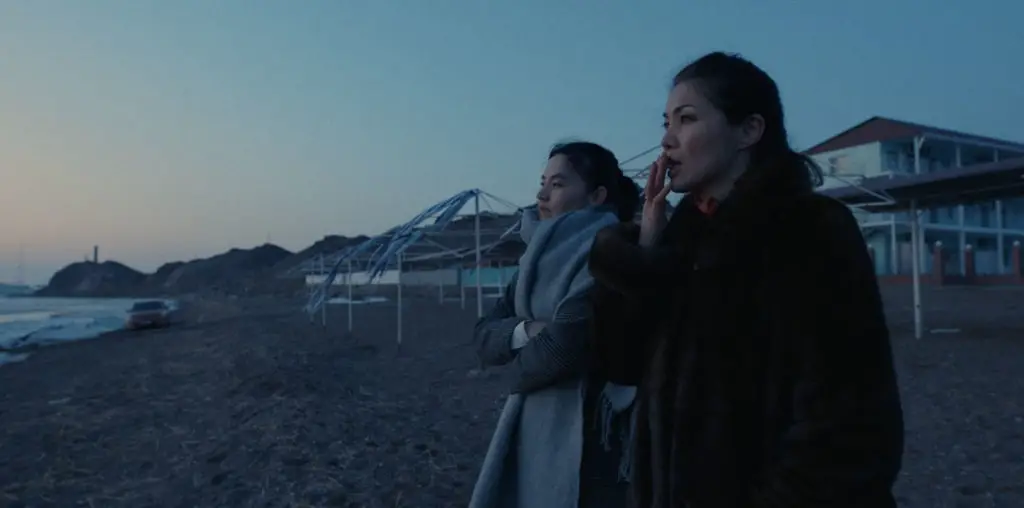
BOOTLEG FILES 540: “The Magnificent Two” (1967 British comedy starring Eric Morecambe and Ernie Wise).
LAST SEEN: The film can be found on YouTube.
AMERICAN HOME VIDEO: None.
REASON FOR BOOTLEG STATUS: A barely recalled blip in the output of Britain’s greatest comedy duo.
CHANCES OF SEEING A COMMERCIAL DVD RELEASE: Not in the United States, sorry.
Unless you are a Briton of a certain age or a rabid Anglophile, you are probably unaware of the comedy team of Eric Morecambe and Ernie Wise. From the 1950 through the 1970s, Morecambe and Wise’s distinctive humor were a mainstay of British theaters and television. For many years, Morecambe and Wise’s TV Christmas specials were a jolly Yuletide tradition – and their wacky skits involving such diverse guest stars as the Beatles, Shirley Bassey, Andre Previn, Peter Cushing, Cliff Richard, Elton John and Glenda Jackson are considered among the most priceless moments in the history of British comedy.
During the mid-1960s, Morecambe and Wise tried to expand their audience base. First, they sought to gain a foothold in America by accepting an invitation from Ed Sullivan to appear on his high-rated variety show. But despite making several highly promoted guest shots, the comics failed to connect with American audiences. Morecambe would later blame the Sullivan operation for requiring them to tone down elements of their act that were considered too ‘blue” for American television.
The pair also decided to branch out in feature films. But their initial efforts, the 1965 James Bond parody “The Intelligence Men” and the 1966 jewel theft caper “That Riviera Touch,” failed to capture the vibrancy of their stage and TV act. Some critics felt that Morecambe and Wise worked better with a live audience that was appreciative of their unpredictable ad-libbing and wacky slapstick. Other critics noted that the comics were burdened with poor material and low-budget surroundings that made them look shabby.
Still, they shouldered on for a third feature film: a 1967 effort called “The Magnificent Two.” This production has some degree of educational value, because it offers an extraordinary lesson in how not to make a comedy movie.
“The Magnificent Two” opens with a Sergio Leone-inspired sequence involving gun-toting desperadoes awaiting the arrival of a train. But this is not Leone’s version of the Old West. Instead, the film takes place in the mythical Latin American nation of Parazuelia, and Morecambe and Wise emerge from the train as British toy salesmen who had the bad fortune of being sent to peddle their wares in this unlikely location.
The duo set up a table to sell a case of war-related toys in a village plaza, unaware that chaos is ensuing around them. Government military forces engage in a gun battle with revolutionaries. The befuddled and bespectacled Morecambe is mistaken for Torres, the son of the revolutionaries’ leader – in fact, Torres was on the train that delivered Morecambe and Wise, but he was killed while en route. When the revolutionaries discover that Torres is dead, Morecambe is recruited to imitate him. After the revolutionaries take control of the country, Morecambe is put in charge – and he promptly begins to push for new laws that run counter to the revolutionaries’ mission.
If you haven’t found any of the plot synopsis to be mildly funny, you are not alone. “The Magnificent Two” is astonishing for its complete lack of humor. Instead, director Cliff Owen and his screenwriters put an undue emphasis on violence – the film is excessively stuffed with gunfire, hand grenade explosions and the constant threat of painful death. Rather than attempt to plumb the more ridiculous aspects of Latin American political upheaval (think of Woody Allen’s “Bananas”), the filmmakers opted to play the chaos completely seriously while having their comics tiptoe through the tumult.
However, “The Magnificent Two” is not designed for Morecambe and Wise. Instead, it seems to be a half-assed Abbott and Costello knockoff, with Morecambe as the bedraggled Costello-style goofball that keeps getting himself into outlandish mishaps and Wise as the endlessly exasperated Abbott-type who cannot comprehend his partner’s foolishness. But these roles were totally antithetical to the Morecambe and Wise personas that ruled on stage and television, with Morecambe as the fast-talking jokester and Wise as the patient butt of his wisecracks. The film also concludes with a bizarre battle sequence involving an all-female brigade wearing army helmets and bikinis – some puerile humor that was closer to Benny Hill than Morecambe and Wise.
Witty twists of language was a staple of the Morecambe and Wise act, yet the snappy remarks are few and feeble here. For example, when Wise gets horizontal and announces, “I’m going to siesta,” Morecambe responds by saying, “Give her my regards.” And when a sultry female revolutionary tells Morecambe that she will always be behind him, he asks, “You’ll come around the front now and again, won’t you?”
Through most of the film, Morecambe and Wise seem vaguely indifferent to their material. But maybe an inconvenient discovery during the production soured Morecambe and Wise on the project. “The Magnificent Two” was shot at the legendary Pinewood Studios, and the 007 epic “You Only Live Twice” was being shot on an adjacent sound stage. During a lull in their production, Morecambe and Wise wandered over to see the neighboring efforts – and were shocked to discover that the cost of one of the sets on the James Bond film was more than the entire budget on “The Magnificent Two.”
“The Magnificent Two” opened in Britain in the summer of 1967 to poor reviews and middling business. Columbia Pictures released the film in Canada under the title “What Happened at Campo Grande?” and the film turned up in other foreign markets but there was no U.S. theatrical release. It did turn up on U.S. television in the 1970s, syndicated for broadcast on several independent stations. No U.S. DVD release ever occurred, although a British DVD import can be found on Amazon.
Morecambe and Wise stayed away from making movies, concentrating on television and stage appearances. Morecambe once rued that the duo should have been successful in movies, quipping, “If we had Neil Simon writing for us and Billy Wilder directing, I know we could be international stars.” They made one final try with the 1983 effort “Night Train to Murder.” But that film turned out to be ghastly and was withheld from release until after Morecambe’s death in 1984.
A couple of weeks ago, an unauthorized posting of the complete version of “The Magnificent Two” turned up on YouTube. While fans who know Morecambe and Wise might be curious to see what their failed movie endeavors were like, those who are not familiar with the team are better advised to locate their classic TV sketches and avoid their films completely.
IMPORTANT NOTICE: The unauthorized duplication and distribution of copyright-protected material, either for crass commercial purposes or profit-free s***s and giggles, is not something that the entertainment industry appreciates. On occasion, law enforcement personnel boost their arrest quotas by collaring cheery cinephiles engaged in such activities. So if you are going to copy and distribute bootleg material, a word to the wise: don’t get caught. Oddly, the purchase and ownership of bootleg DVDs is perfectly legal. Go figure!


And Time-Life syndicated a half-hour version of their BBC series in the US around 1980,(In the wake of Benny Hill), but it apparantly didn’t do that well.
Morecambe & Wise were wonderfully funny and inventive comedians. Many of their finest TV moments (especially their brilliant encounter with Andre Previn) can be seen on YouTube. But Kevin is correct – cinema was not their medium and they were best appreciated in the distinctive confines of the smaller screen.
Morecambe and Wise’s TV show was repackaged for ABC-TV as a summer replacement for “Hollywood Palace.” (It was renamed “Piccadilly Palace.”) I remember it as being extremely funny, although I was pretty young at the time. Their one appearance that I saw on the Sullivan show was quite disappointing, however. But as with Ernie Kovacs, who was brilliant on TV, I can’t really picture M & W being nearly as entertaining in movies.
I quite like Night Train to Murder. It was written by the duo, showcased some of their stage material, and was a love letter to the old midnight adventure/romance TV films of the 40’s & 50’s. Plus, it has some great production values for the time. I caught it late night, a few years ago, and did some reading about the duo (being an American, I hadn’t heard of them before). I haven’t seen The Magnificent Two, but you can watch Midnight Train on YouTube. It’s worth a look, IMHO.
@John – “Bedazzled” was released in the US, but Peter Cook and Dudley Moore never actively pursued a film career as a comedy duo – their act was more successful on the stage and British TV. While the Ealing comedies and Terry-Thomas were able to make a successful leap across the Atlantic, most British comedy never made any impact stateside until PBS began dumping BBC comedies across their line-up in the 1970s. As for “The Maltese Bippy,” the film is awful – but in a genuinely fascinating way (Rowan and Martin tried too hard to be funny). With “The Magnificent Two,” the stars obviously did not have their hearts in the material.
I’m trying to think of the British comics who HAVE been successful in the U.S. since I’ve been watching movies and TV. Peter Sellers, Benny Hill, and Monty Python come to mind, Surely there are more, but I can’t think of them. I loved Peter Cook and Dudley Moore in BEDAZZLED, but I don’t know if that was even released theatrically in the U.S.
I recall that you said that the Abbott and Costello schtick also was forced on Rowan and Martin when they made their unsuccessful film THE MALTESE BIPPY, which was released only two years after THE MAGNIFICENT TWO. Personally, I never cared for Abbott and Costello, so both of these movies would probably be a slog for me – although I’d probably undertake it to watch Rowan and Martin.